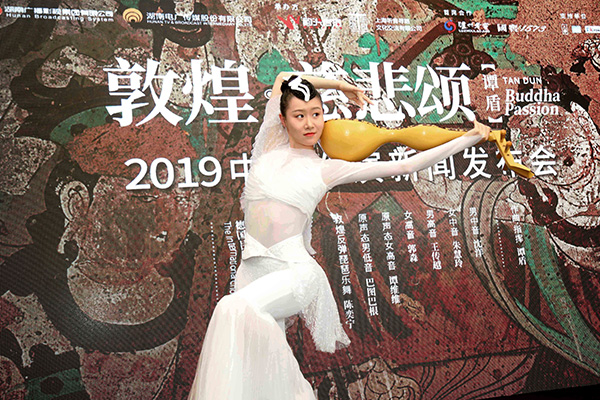 |
|
Dancer Chen Yining showcases the ancient Chinese instrument pipa during a news conference in Beijing on May 17.[Photo provided to China Daily] |
With Buddha Passion, he turned the murals into musical characters and condensed the stories told through the murals into the six acts of the composition.
The first act, titled The Bodhi Tree, tells the story of a little prince trying to save a dead bird. After meditating under the tree for 49 days, he is enlightened and eulogizes about men loving all creatures and that all creatures are created equal.
The other acts deal with themes like sacrifice, nature and Nirvana.
"The Mogao Caves present thousands of years of Chinese history from different aspects, such as art, Buddhism and music. It's an important part of the ancient Silk Road. The murals of Dunhuang's Mogao Caves are full of traditional Chinese wisdom and philosophy, which he (Tan) has translated into music. It helps to spread the messages from ancient China to the world," says Zhang Xiantang, vice-dean of the Dunhuang Research Institute, in Beijing.
Sylvie Bouchard, who represents the Orchestre National de Lyon and the International Choir Academy Lubeck, says Tan told her about the tour two years ago when his other work, Nyu Shu: The Secret Songs of Women, was staged in Lyon, France. The Orchestre National de Lyon will join in the tour with Tan in June to mark the 55th anniversary of the establishment of diplomatic relations between China and France.
"We have enjoyed a long friendship with Tan Dun. I went to the premiere of Buddha Passion in Dresden and I was impressed by the messages Tan Dun wants to deliver through his music," says Bouchard in Beijing. "Lyon was one of the final stops along the ancient Silk Road. Dunhuang was also once an important stop on the trade route. Today, we will celebrate the ancient sounds with a new contemporary interpretation, which can be enjoyed by both the East and the West."